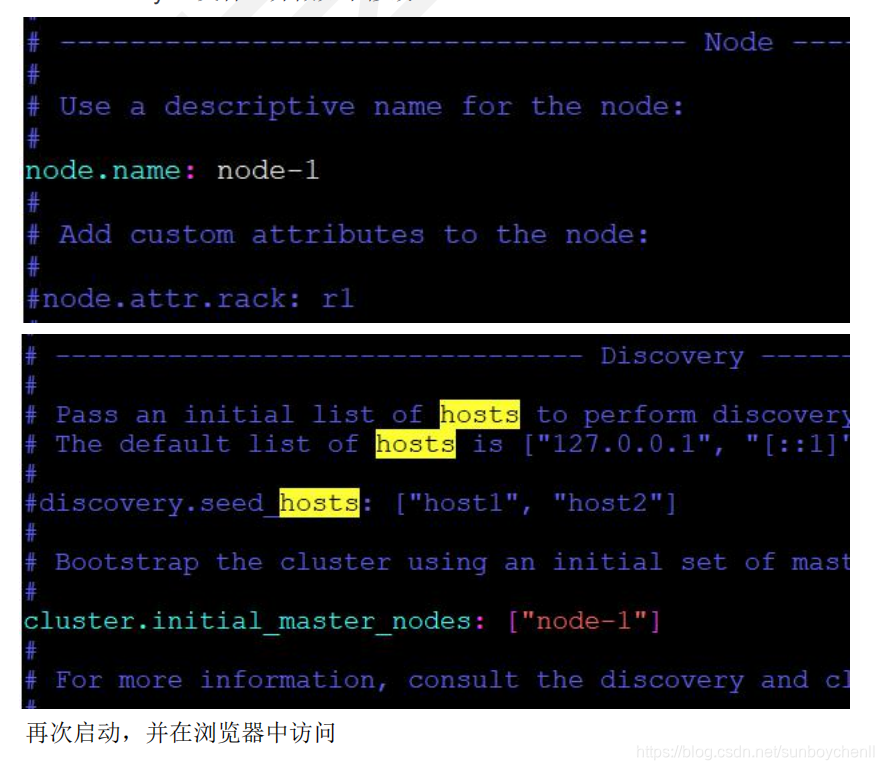

却显示“
拒绝了我们的连接请求
”,因此我们还需要配置一下
Elasticsearch
以允许我们进行外网访问,进入
elasticsearch-7.7.0
下的
config
目录,编辑
elasticsearch.yml
文件,删除
network.host
前的
#
字符,并写入服务器的地址并
保存


http://121.40.42.***:9200/ 显示如下:

Kibana 安装

启动时提示需要用户名和密码登录
{
"type":"log",
"@timestamp":"2019-08-19T09:16:54Z",
"tags":[
"license",
"warning",
"xpack"
],
"pid":4010,
"message":"License information from the X-Pack plugin could not be obtained from Elasticsearch for the [data] cluster. [security_exception] missing authentication credentials for REST request [/_xpack], with { header={ WWW-Authenticate="Basic realm=\"security\" charset=\"UTF-8\"" } } :: {"path":"/_xpack","statusCode":401,"response":"{\"error\":{\"root_cause\":[{\"type\":\"security_exception\",\"reason\":\"missing authentication credentials for REST request [/_xpack]\",\"header\":{\"WWW-Authenticate\":\"Basic realm=\\\"security\\\" charset=\\\"UTF-8\\\"\"}}],\"type\":\"security_exception\",\"reason\":\"missing authentication credentials for REST request [/_xpack]\",\"header\":{\"WWW-Authenticate\":\"Basic realm=\\\"security\\\" charset=\\\"UTF-8\\\"\"}},\"status\":401}","wwwAuthenticateDirective":"Basic realm=\"security\" charset=\"UTF-8\""}"
}

elasticsearch.username: "elastic"
elasticsearch.password: "elasticCll"
nohup ./kibana &
提示:
[~]$ appending output to nohup.out
嗯,证明运行成功,同时把程序运行的输出信息放到当前目录的 nohup.out 文件中去。
nohup 命令
用途:LINUX命令用法,不挂断地运行命令。


查看kibana是否启动了,用如下命令:
netstat -tunlp|grep 5601
netstat -tunlp

由于我们日常的代码开发都是使用的JDK1.8,所以这里不会把JAVA_HOME配置成JDK11,我们只需更改Elasticsearch的启动文件,使它指向我们下载的JDK11.
修改配置文件
[root@centos7 bin]# pwd
/home/wx/elasticsearch-7.9.0/bin
[root@centos7 bin]# vi elasticsearch
添加以下几行内容
#配置自己的jdk11
export JAVA_HOME=/usr/local/jdk-11.0.8/
export PATH=$JAVA_HOME/bin:$PATH
#添加jdk判断
if [ -x "$JAVA_HOME/bin/java" ]; then
JAVA="/usr/local/jdk-11.0.8//bin/java"
else
JAVA=`which java`
fi
4.ELASTICSEARCH文件全部内容

[root@centos7 bin]# cat elasticsearch
#!/bin/bash
# CONTROLLING STARTUP:
#
# This script relies on a few environment variables to determine startup
# behavior, those variables are:
#
# ES_PATH_CONF -- Path to config directory
# ES_JAVA_OPTS -- External Java Opts on top of the defaults set
#
# Optionally, exact memory values can be set using the `ES_JAVA_OPTS`. Example
# values are "512m", and "10g".
#
# ES_JAVA_OPTS="-Xms8g -Xmx8g" ./bin/elasticsearch
#配置自己的jdk11
export JAVA_HOME=/usr/local/jdk-11.0.8
export PATH=$JAVA_HOME/bin:$PATH
#添加jdk判断
if [ -x "$JAVA_HOME/bin/java" ]; then
JAVA="/usr/local/jdk-11.0.8/bin/java"
else
JAVA=`which java`
fi
source "`dirname "$0"`"/elasticsearch-env
CHECK_KEYSTORE=true
DAEMONIZE=false
for option in "$@"; do
case "$option" in
-h|--help|-V|--version)
CHECK_KEYSTORE=false
;;
-d|--daemonize)
DAEMONIZE=true
;;
esac
done
if [ -z "$ES_TMPDIR" ]; then
ES_TMPDIR=`"$JAVA" "$XSHARE" -cp "$ES_CLASSPATH" org.elasticsearch.tools.launchers.TempDirectory`
fi
# get keystore password before setting java options to avoid
# conflicting GC configurations for the keystore tools
unset KEYSTORE_PASSWORD
KEYSTORE_PASSWORD=
if [[ $CHECK_KEYSTORE = true ]] \
&& bin/elasticsearch-keystore has-passwd --silent
then
if ! read -s -r -p "Elasticsearch keystore password: " KEYSTORE_PASSWORD ; then
echo "Failed to read keystore password on console" 1>&2
exit 1
fi
fi
# The JVM options parser produces the final JVM options to start Elasticsearch.
# It does this by incorporating JVM options in the following way:
# - first, system JVM options are applied (these are hardcoded options in the
# parser)
# - second, JVM options are read from jvm.options and jvm.options.d/*.options
# - third, JVM options from ES_JAVA_OPTS are applied
# - fourth, ergonomic JVM options are applied
ES_JAVA_OPTS=`export ES_TMPDIR; "$JAVA" "$XSHARE" -cp "$ES_CLASSPATH" org.elasticsearch.tools.launchers.JvmOptionsParser "$ES_PATH_CONF"`
# manual parsing to find out, if process should be detached
if [[ $DAEMONIZE = false ]]; then
exec \
"$JAVA" \
"$XSHARE" \
$ES_JAVA_OPTS \
-Des.path.home="$ES_HOME" \
-Des.path.conf="$ES_PATH_CONF" \
-Des.distribution.flavor="$ES_DISTRIBUTION_FLAVOR" \
-Des.distribution.type="$ES_DISTRIBUTION_TYPE" \
-Des.bundled_jdk="$ES_BUNDLED_JDK" \
-cp "$ES_CLASSPATH" \
org.elasticsearch.bootstrap.Elasticsearch \
"$@" <<<"$KEYSTORE_PASSWORD"
else
exec \
"$JAVA" \
"$XSHARE" \
$ES_JAVA_OPTS \
-Des.path.home="$ES_HOME" \
-Des.path.conf="$ES_PATH_CONF" \
-Des.distribution.flavor="$ES_DISTRIBUTION_FLAVOR" \
-Des.distribution.type="$ES_DISTRIBUTION_TYPE" \
-Des.bundled_jdk="$ES_BUNDLED_JDK" \
-cp "$ES_CLASSPATH" \
org.elasticsearch.bootstrap.Elasticsearch \
"$@" \
<<<"$KEYSTORE_PASSWORD" &
retval=$?
pid=$!
[ $retval -eq 0 ] || exit $retval
if [ ! -z "$ES_STARTUP_SLEEP_TIME" ]; then
sleep $ES_STARTUP_SLEEP_TIME
fi
if ! ps -p $pid > /dev/null ; then
exit 1
fi
exit 0
fi




 本文详细介绍了如何解决Elasticsearch外网访问问题,通过编辑elasticsearch.yml文件来配置网络主机,以及Kibana启动时遇到的需要用户名和密码登录的问题。此外,还提供了如何将Elasticsearch配置为使用JDK11的方法。
本文详细介绍了如何解决Elasticsearch外网访问问题,通过编辑elasticsearch.yml文件来配置网络主机,以及Kibana启动时遇到的需要用户名和密码登录的问题。此外,还提供了如何将Elasticsearch配置为使用JDK11的方法。
















 6249
6249

 被折叠的 条评论
为什么被折叠?
被折叠的 条评论
为什么被折叠?








